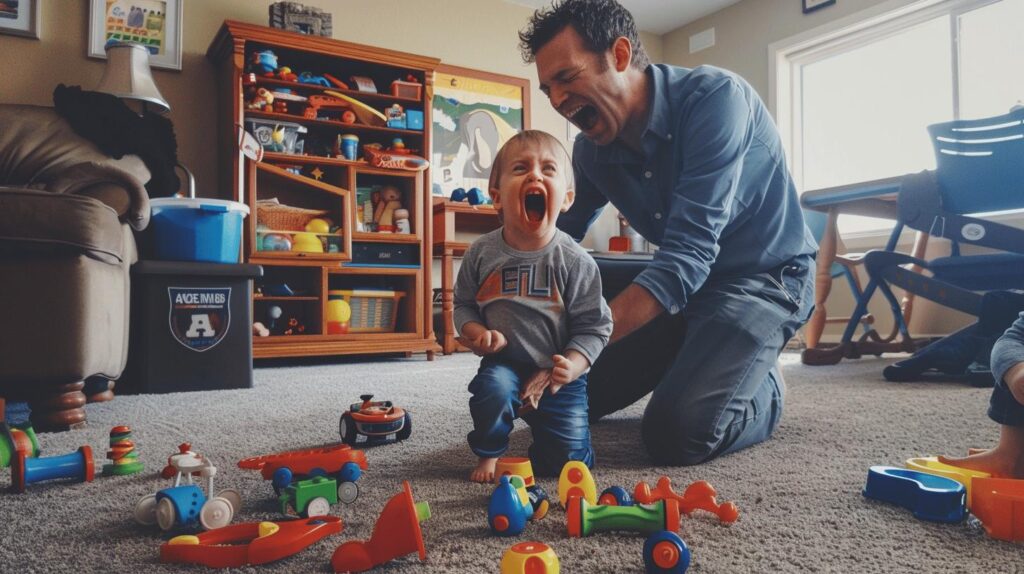Ever questioned your abilities as a parent? You’re not alone. Many parents grapple with feelings of inadequacy, doubting their every move. This journey isn’t about perfection; it’s about resilience and growth. In today’s blog post, "Failing at Parenting: How to Overcome and Thrive," we’ll dive into why these feelings arise, identify common signs, and share stories and strategies to help you turn things around. Understanding that it’s normal to feel this way is the first step toward thriving as a parent. Ready to learn more? Let’s get started.
Understanding the Feeling of Failing at Parenting
Many parents struggle with feelings of inadequacy and question their parenting abilities. These feelings often arise due to societal pressures and personal expectations. Society tends to paint a picture of the "perfect parent," which can be an impossible standard to meet. Parents may also place high expectations on themselves, striving to give their children the best of everything. When reality doesn't match these ideals, feelings of failure can set in.
Common signs of feeling like a failure as a parent include constant self-doubt, comparing oneself to other parents, and feeling overwhelmed by daily challenges. Parents may frequently question their decisions and worry if they're doing enough for their children. Comparing oneself to others, especially on social media, can exacerbate these feelings. Everyday struggles, like managing tantrums or handling schoolwork, can add to the sense of inadequacy.
- A mom feeling guilty for not being able to attend all of her child's school events due to work commitments.
- A dad feeling overwhelmed by the demands of parenting multiple children and doubting his ability to give each one enough attention.
- A parent comparing their child's academic performance to others and feeling like they haven't supported their learning enough.
- A single parent struggling to balance work and family life, feeling like they're falling short in both areas.
- A parent dealing with a child's behavioral issues, questioning if their discipline methods are effective.
These feelings are normal and experienced by many parents. It's important to recognize that even experienced parents face struggles and that it is okay to have difficult days. Understanding that these feelings are part of the parenting journey can help reduce the pressure to be perfect and allow parents to focus on doing their best.
Common Challenges Leading to Feelings of Failure in Parenting

Parenting can be immensely rewarding, but it also brings a multitude of challenges that can make parents feel like they're failing. One of the most significant issues is balancing work and family life. Many parents struggle to find time for both their careers and their children, leading to feelings of guilt and inadequacy. Financial stress is another common challenge, as providing for a family can be financially draining and add pressure. Additionally, maintaining discipline and establishing boundaries can be tough, as every child is different and what works for one may not work for another.
Specific challenges can amplify these feelings, such as dealing with difficult behavior or managing teenage rebellion. Children can exhibit problematic behaviors that leave parents feeling helpless and frustrated. Teenagers, in particular, can be challenging as they assert their independence and may rebel against parental authority. This phase can be especially taxing, leading parents to question their methods and worry about their child’s future.
- Set realistic expectations: Understand that no one is perfect and it's okay to have off days.
- Focus on small successes: Celebrate small wins to build confidence and positive momentum.
- Seek support: Reach out to friends, family, or parenting groups for advice and encouragement.
- Create a routine: Establish a consistent daily schedule to reduce stress and improve time management.
- Prioritize self-care: Take time for yourself to recharge and maintain your mental health.
Seeking support and setting realistic expectations are crucial steps in overcoming these challenges. Connecting with other parents through support groups or social networks provides valuable advice and emotional backing. Realizing that perfection is unattainable and that it's okay to make mistakes can alleviate much of the pressure parents place on themselves.
Effects of Perceived Parenting Failure on Children
When parents feel like they are failing, it can have several negative effects on their children. Emotional stress is one of the most immediate impacts. Children are perceptive and can sense their parents' anxiety and stress, which can make them feel anxious themselves. Low self-esteem is another potential outcome. If parents continually express feelings of inadequacy, children might internalize these negative emotions and doubt their own worth. Additionally, inconsistent parenting arising from stress can lead to behavioral issues. Children thrive on stability, and when parents are overwhelmed, it can disrupt the consistency needed for healthy development. Lastly, children may feel a lack of support if their parents are too consumed by their own struggles to provide adequate emotional and physical attention.
To mitigate these negative effects, self-care for parents is crucial. Taking time to recharge and maintain well-being has a positive impact on both parents and children. When parents prioritize their own mental health, they are better equipped to handle the challenges of parenting. This not only improves their emotional stability but also sets a positive example for their children. Self-care enables parents to be more present and engaged, fostering a supportive and nurturing environment that benefits the entire family.
|Effect on Children|Reason|
|—|—|
|Emotional Stress|Parents' anxiety and stress can transfer to children.|
|Low Self-Esteem|Children may internalize their parents' negative feelings.|
|Behavioral Issues|Inconsistent parenting due to stress can lead to behavioral problems.|
|Lack of Support|Children may feel unsupported if parents are overwhelmed.|
Practical Strategies for Overcoming Feelings of Failure

Practicing self-compassion is crucial for any parent struggling with feelings of failure. Recognizing that no parent is perfect can alleviate a lot of unnecessary pressure. It's important to understand that making mistakes is part of the learning process. By accepting that perfection is unattainable, parents can approach their roles with more kindness towards themselves, reducing the burden of guilt and anxiety.
Setting realistic goals, seeking support, and learning from mistakes are practical strategies that can make a significant difference. Start by setting achievable goals instead of striving for perfection. This can make parenting duties more manageable and less overwhelming. Seeking support from friends, family, or parenting groups provides a network of encouragement and advice. Learning from mistakes involves reflecting on what went wrong and how to improve, rather than dwelling on the failure itself.
- Parenting Classes: Offer structured guidance and practical advice.
- Books: Provide expert insights and various perspectives on parenting.
- Online Forums: Allow parents to share experiences and receive support.
- Therapists: Professional counselors can offer personalized strategies.
- Support Groups: Create a sense of community and shared understanding.
Implementing these strategies can lead to numerous benefits. Practicing self-compassion helps parents maintain a healthier mindset, which directly impacts their ability to care for their children. Setting realistic goals and seeking support can significantly reduce stress and improve overall well-being. Learning from mistakes fosters resilience and continuous improvement. By embracing these approaches, parents are better equipped to overcome feelings of failure and thrive in their parenting journey.
Personal Stories and Expert Advice on Parenting Failures
One parent, Jessica, shared her experience of feeling overwhelmed and inadequate while raising her two children. She often doubted her ability to balance work and family life, leading to feelings of failure. Jessica's turning point came when she joined a local parenting group. There, she discovered that many parents faced similar struggles. Through shared experiences and collective support, Jessica learned to be kinder to herself and accept that perfection was unattainable. This shift in mindset enabled her to approach parenting with renewed confidence and resilience.
Experts recommend handling these feelings by practicing self-compassion and recognizing that everyone has difficult days. A key piece of advice is to understand that there is no single strategy that will solve all parenting issues. This realization helps reduce the pressure to find a perfect solution. Instead, adopting a flexible approach allows parents to adapt to changing circumstances and the unique needs of their children. Flexibility in parenting enables parents to be more responsive and effective, ensuring they can provide the best care possible despite inevitable setbacks.
Flexible Approaches in Parenting
Flexibility is crucial in parenting because it accommodates the dynamic nature of raising children. Here are some flexible strategies that have worked for others:
- Adjusting Discipline Methods: Tailoring discipline to fit each child's temperament can improve behavior management.
- Open Communication: Encouraging open dialogue helps address issues as they arise and strengthens the parent-child relationship.
- Routine Modifications: Being willing to change routines based on what works best for the family at any given time.
- Seeking Help When Needed: Recognizing when to ask for assistance, whether from family, friends, or professionals, ensures parents are supported.
By embracing these flexible approaches, parents can navigate the complexities of parenting more effectively and with greater ease.
Building Resilience and Moving Forward

Learning from mistakes is crucial for any parent aiming to build resilience. When parents acknowledge their errors and reflect on what went wrong, they gain valuable insights that can improve their parenting methods. This process not only fosters personal growth but also sets a positive example for children, teaching them that mistakes are opportunities to learn and grow. Building resilience involves developing the ability to bounce back from setbacks, which is essential for both parents and children.
Rebuilding trust with your child after a mistake is key to moving forward positively. Open communication is crucial; take the time to apologize sincerely and discuss what happened. This helps children understand that everyone makes mistakes and that it's important to make amends. Developing a plan for handling similar situations in the future can also empower parents and provide a sense of direction. By addressing issues directly and creating a strategy for improvement, parents can regain their confidence and strengthen their relationship with their children.
- Open Communication: Talk openly about mistakes and apologize sincerely to rebuild trust.
- Reflect and Learn: Take time to understand what went wrong and how to improve.
- Create a Plan: Develop a strategy for handling similar situations in the future.
- Seek Support: Reach out to friends, family, or professionals for guidance and encouragement.
Final Words
Understanding why parents often feel like they are failing is essential. The blog post shed light on societal pressures and personal expectations as major contributors to these feelings.
Common parenting challenges can amplify the feeling of failing at parenting, highlighting how critical it is to seek support and set realistic goals.
Recognizing the impact on children and the importance of self-care can help parents manage these emotions better.
Practical strategies and personal stories provide reassurance and practical steps to overcome feelings of failure.
Remember, no parent is perfect. Embrace the journey and recognize your efforts in raising healthy, happy children.
FAQ
What is depleted mother syndrome?
Depleted mother syndrome is a condition where mothers feel drained physically and emotionally due to the overwhelming demands of parenting.
What is the most exhausting age to parent?
The toddler years, typically ages 1-3, are considered the most exhausting due to constant supervision and high energy needs.
Is it normal to feel like you failed as a parent?
Yes, it's normal. Many parents experience feelings of inadequacy and self-doubt, especially when facing challenges and societal pressures.
What to do when you're failing as a parent?
When feeling like you're failing as a parent, practice self-compassion, set realistic goals, seek support, and focus on small successes.


